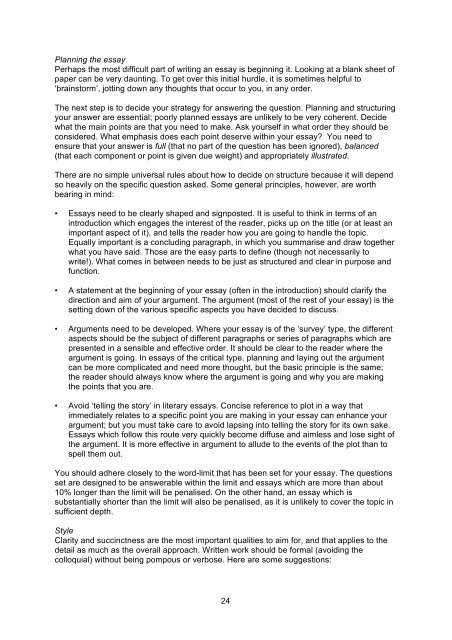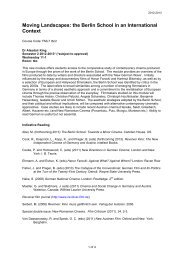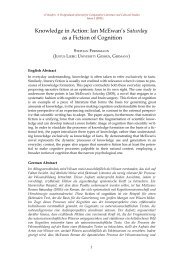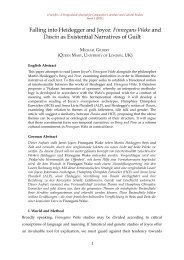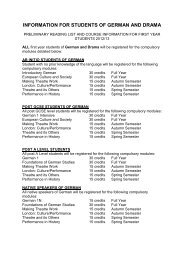Student Handbook - The School of Language, Linguistics and Film
Student Handbook - The School of Language, Linguistics and Film
Student Handbook - The School of Language, Linguistics and Film
You also want an ePaper? Increase the reach of your titles
YUMPU automatically turns print PDFs into web optimized ePapers that Google loves.
Planning the essay<br />
Perhaps the most difficult part <strong>of</strong> writing an essay is beginning it. Looking at a blank sheet <strong>of</strong><br />
paper can be very daunting. To get over this initial hurdle, it is sometimes helpful to<br />
‘brainstorm’, jotting down any thoughts that occur to you, in any order.<br />
<strong>The</strong> next step is to decide your strategy for answering the question. Planning <strong>and</strong> structuring<br />
your answer are essential; poorly planned essays are unlikely to be very coherent. Decide<br />
what the main points are that you need to make. Ask yourself in what order they should be<br />
considered. What emphasis does each point deserve within your essay? You need to<br />
ensure that your answer is full (that no part <strong>of</strong> the question has been ignored), balanced<br />
(that each component or point is given due weight) <strong>and</strong> appropriately illustrated.<br />
<strong>The</strong>re are no simple universal rules about how to decide on structure because it will depend<br />
so heavily on the specific question asked. Some general principles, however, are worth<br />
bearing in mind:<br />
• Essays need to be clearly shaped <strong>and</strong> signposted. It is useful to think in terms <strong>of</strong> an<br />
introduction which engages the interest <strong>of</strong> the reader, picks up on the title (or at least an<br />
important aspect <strong>of</strong> it), <strong>and</strong> tells the reader how you are going to h<strong>and</strong>le the topic.<br />
Equally important is a concluding paragraph, in which you summarise <strong>and</strong> draw together<br />
what you have said. Those are the easy parts to define (though not necessarily to<br />
write!). What comes in between needs to be just as structured <strong>and</strong> clear in purpose <strong>and</strong><br />
function.<br />
• A statement at the beginning <strong>of</strong> your essay (<strong>of</strong>ten in the introduction) should clarify the<br />
direction <strong>and</strong> aim <strong>of</strong> your argument. <strong>The</strong> argument (most <strong>of</strong> the rest <strong>of</strong> your essay) is the<br />
setting down <strong>of</strong> the various specific aspects you have decided to discuss.<br />
• Arguments need to be developed. Where your essay is <strong>of</strong> the ‘survey’ type, the different<br />
aspects should be the subject <strong>of</strong> different paragraphs or series <strong>of</strong> paragraphs which are<br />
presented in a sensible <strong>and</strong> effective order. It should be clear to the reader where the<br />
argument is going. In essays <strong>of</strong> the critical type, planning <strong>and</strong> laying out the argument<br />
can be more complicated <strong>and</strong> need more thought, but the basic principle is the same;<br />
the reader should always know where the argument is going <strong>and</strong> why you are making<br />
the points that you are.<br />
• Avoid ‘telling the story’ in literary essays. Concise reference to plot in a way that<br />
immediately relates to a specific point you are making in your essay can enhance your<br />
argument; but you must take care to avoid lapsing into telling the story for its own sake.<br />
Essays which follow this route very quickly become diffuse <strong>and</strong> aimless <strong>and</strong> lose sight <strong>of</strong><br />
the argument. It is more effective in argument to allude to the events <strong>of</strong> the plot than to<br />
spell them out.<br />
You should adhere closely to the word-limit that has been set for your essay. <strong>The</strong> questions<br />
set are designed to be answerable within the limit <strong>and</strong> essays which are more than about<br />
10% longer than the limit will be penalised. On the other h<strong>and</strong>, an essay which is<br />
substantially shorter than the limit will also be penalised, as it is unlikely to cover the topic in<br />
sufficient depth.<br />
Style<br />
Clarity <strong>and</strong> succinctness are the most important qualities to aim for, <strong>and</strong> that applies to the<br />
detail as much as the overall approach. Written work should be formal (avoiding the<br />
colloquial) without being pompous or verbose. Here are some suggestions:<br />
24


